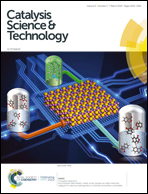Oligomerization of ethanol-derived propene and isobutene mixtures to transportation fuels: catalyst and process considerations†
Abstract
In this paper, we report on solid acid catalysts and process conditions suitable for oligomerization of ethanol-derived mixed olefins propene and isobutene to transportation fuels, specifically targeting high-octane gasoline or jet-range hydrocarbons with high carbon efficiency. Catalytic performance was evaluated for two classes of solid acid catalysts—zeolites (H-ZSM-5, H-Y, H-beta) and polymeric resins (Amberlyst-36, Purolite-CT275)—each of which offer different catalytic properties. Two representative model olefin feeds: 1) diisobutene and 2) isobutene/propene (4/1 mol) mixture were used. Interestingly, both classes of solid acid catalysts can be tuned to produce a similar jet-distillate range hydrocarbon product with temperature determined to be the critical operating process parameter. For example, the propene conversion over H-beta zeolite was dramatically increased from 7 to 87% when the temperature was increased from 140 to 200 °C; whereas, nearly all (>99%) of the isobutene was converted over the same temperature range. However, with this relatively modest temperature increment (60 °C), formation of products in the jet-distillate range dramatically decreased from 90 to 65%, thus revealing an important activity/selectivity trade-off associated with the reaction temperature. Processing of aqueous ethanol to liquid hydrocarbon product was demonstrated in two sequential catalytic steps: 1) conversion of ethanol to an isobutene/propene-rich gas mixture over Zn1Zr2.5Oz catalyst, followed by 2) oligomerization over solid acid resin (Amberlyst-36). This processing sequence produced a highly branched olefin product primarily in the gasoline range (70% mass yield based on simulated distillation) with a high octane rating (approximate research octane number [RON] of 103). To increase the carbon yield to that of jet-range hydrocarbons, separation of the olefins from the light gases (i.e., H2, CO2, etc.) is required prior to oligomerization. Thus, in a separate set of experiments, an isobutene/propene mixture was converted over either H-beta (200 °C) or Purolite-CT275 (120 °C). This conversion step produced jet-range hydrocarbons with 80–85% mass yield. Upon subsequent distillation and hydrotreatment, both liquid products met select ASTM 7566 Annex A5 specifications for an alcohol-to-jet synthetic paraffinic kerosene (ATJ-SPK) blending component (e.g., specifications for freezing point, flash point, viscosity, and density).

- This article is part of the themed collection: Catalysis for sustainable development


 Please wait while we load your content...
Please wait while we load your content...
